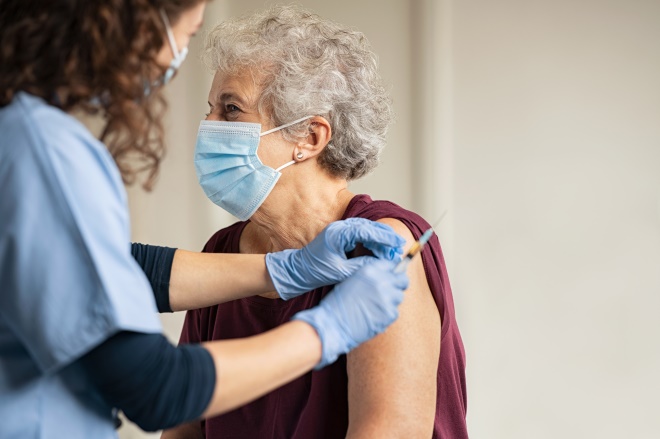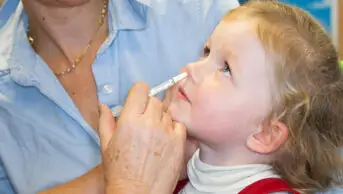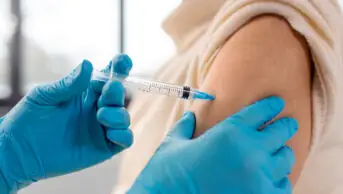Open access article
The Royal Pharmaceutical Society has made this article free to access in order to help healthcare professionals stay informed about an issue of national importance.
To learn more about coronavirus, please visit: https://www.rpharms.com/resources/pharmacy-guides/wuhan-novel-coronavirus

Source: Shutterstock.com
Prime minister Boris Johnson said community pharmacies play a “potentially vital role” in the vaccination programme
The government has signed up “hundreds” of community pharmacies to deliver the COVID-19 vaccine to patients, the prime minister has said.
Speaking in the House of Commons on 6 January 2021, prime minister Boris Johnson said community pharmacies play a “potentially vital role” in the vaccination programme.
COVID-19 vaccination sites led by community pharmacies are expected to start administering vaccines to patients in England from the week beginning 11 January 2021.
So far, Boots has confirmed that it will be running three vaccination centres in Halifax, West Yorkshire, Huddersfield, West Yorkshire and Gloucester, while Superdrug has announced that it will be running five vaccination sites “in the north and south of England”.
However, NHS England has said it is not able to share the exact number of pharmacies that will be delivering the vaccine as some details are still being finalised.
Johnson told Parliament that the government “has already signed up hundreds [of community pharmacies] to the campaign and … there will be many more to follow”.
His comments follow calls to include more community pharmacies in the rollout of the vaccine.
Former prime minister Tony Blair’s Institute for Global Change published a paper on 6 January 2021 recommending that the government expand the COVID-19 vaccination programme to “all pharmacies regardless of their size”.
The paper, ‘A blueprint for accelerated vaccine rollout’, said that delivering the COVID-19 vaccine manufactured by AstraZeneca is “comparable to delivering the flu vaccine, which can be given by GPs and in local pharmacies”.
The Medicines and Healthcare products Regulatory Agency announced on 30 December 2020 that it had authorised Oxford University/AstraZeneca’s COVID-19 vaccine for use.
The vaccine requires the administration of two doses per patient, which is the same as the Pfizer-manufactured COVID-19 vaccine, but only needs to be kept at normal refrigeration temperatures.
Andrew Lane, chair of the National Pharmacy Association, said the approval of the Oxford University/AstraZeneca vaccine “means that many more pharmacies are now capable of offering vaccinations”.
“The vast majority of pharmacies provide flu vaccinations, so there are thousands of potential local pharmacy sites for vaccinating against COVID, capable of protecting millions of people within weeks,” he said.
“We are bound to ask: what on earth is stopping the NHS from mobilising more pharmacies for this vital task?
“Pharmacists want to help, they are already trained for giving vaccines, and people are crying out for convenient local access to the vaccine. It’s surely a no-brainer that pharmacies should be supported to take part in this urgent national effort.”
Video: The government has signed up ‘hundreds’ of community pharmacies and there will be more to follow, says @BorisJohnson on the COVID-19 vaccination programmehttps://t.co/pTEfs7huU7
pic.twitter.com/VagLY8xUPA— The Pharmaceutical Journal (@PJOnline_News) January 6, 2021
In an email update to contractors, the Pharmaceutical Services Negotiating Committee said that if the government is to achieve its “ambitious COVID-19 vaccination plan, we believe the NHS should look to community pharmacies”.
“Pharmacies have a strong track-record in vaccinations and they have been open throughout the COVID-19 pandemic offering healthcare advice close to people’s homes: we should make the most of this formidable healthcare network to help with this latest challenge,” the email said.
“With the AstraZeneca vaccine, we believe that the skillsets of more pharmacists could be brought into this whole thing,” said Leyla Hannbeck, chief executive of the Association of Independent Multiple Pharmacies.
“We’ve got the facilities, we’ve got the recording mechanisms, we’ve got the skills,” she told The Pharmaceutical Journal.
“If you think about it, each community pharmacy delivering a minimum of 15 vaccinations, at 11,400 pharmacies in England alone — that would give you over a million vaccinations a week. What are the logistical barriers of getting community pharmacy involved like we do every year with flu?”
An NHS spokesperson said: “Pharmacies are already working with GPs to deliver the vaccine in many areas of the country and, as more supply becomes available, community pharmacists able to administer large numbers of vaccine will be the first to play a role in the NHS’s phased vaccination programme — the biggest in the health service’s history.”


